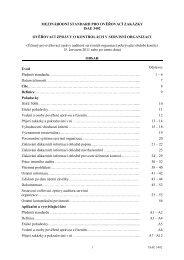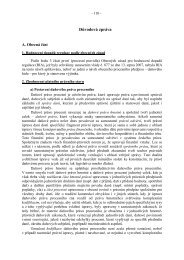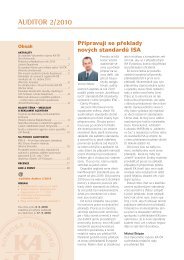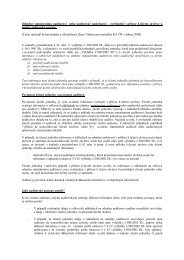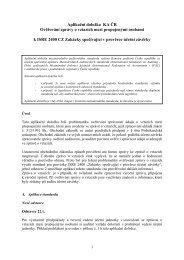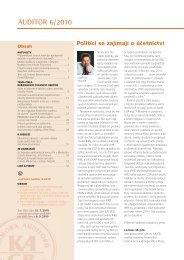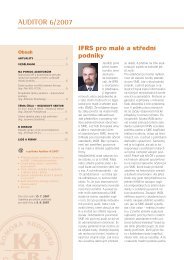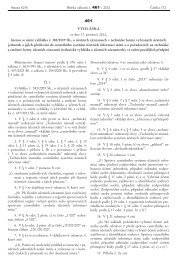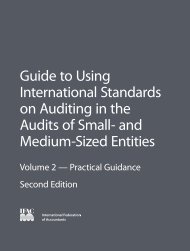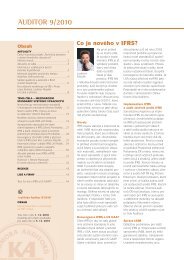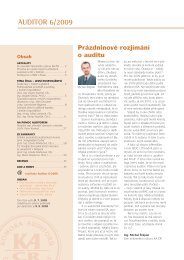Guide to Using International Standards on Auditing in - IFAC
Guide to Using International Standards on Auditing in - IFAC
Guide to Using International Standards on Auditing in - IFAC
Create successful ePaper yourself
Turn your PDF publications into a flip-book with our unique Google optimized e-Paper software.
76<br />
<str<strong>on</strong>g>Guide</str<strong>on</strong>g> <str<strong>on</strong>g>to</str<strong>on</strong>g> <str<strong>on</strong>g>Us<strong>in</strong>g</str<strong>on</strong>g> <str<strong>on</strong>g>Internati<strong>on</strong>al</str<strong>on</strong>g> <str<strong>on</strong>g>Standards</str<strong>on</strong>g> <strong>on</strong> <strong>Audit<strong>in</strong>g</strong> <strong>in</strong> the Audits of Small- and Medium-Sized Entities Volume 1—Core C<strong>on</strong>cepts<br />
Anti-fraud c<strong>on</strong>trols can be designed <str<strong>on</strong>g>to</str<strong>on</strong>g> address all five <strong>in</strong>ternal c<strong>on</strong>trol comp<strong>on</strong>ents. However, <strong>in</strong> relati<strong>on</strong> <str<strong>on</strong>g>to</str<strong>on</strong>g><br />
risks of material misstatement <strong>in</strong> the f<strong>in</strong>ancial statements, special emphasis is placed <strong>on</strong> the <str<strong>on</strong>g>to</str<strong>on</strong>g>ne set at the<br />
<str<strong>on</strong>g>to</str<strong>on</strong>g>p of the entity. This addresses the attitudes and acti<strong>on</strong>s of management <str<strong>on</strong>g>to</str<strong>on</strong>g>ward c<strong>on</strong>trol, and is part of the<br />
c<strong>on</strong>trol envir<strong>on</strong>ment (see Volume 1, Chapter 5.3 above) which <strong>in</strong>fluences the c<strong>on</strong>trol c<strong>on</strong>sciousness of all<br />
pers<strong>on</strong>nel. A good “<str<strong>on</strong>g>to</str<strong>on</strong>g>ne at the <str<strong>on</strong>g>to</str<strong>on</strong>g>p” is c<strong>on</strong>sidered by far the most effective anti-fraud c<strong>on</strong>trol of all.<br />
Two examples of anti-fraud c<strong>on</strong>trols applicable for smaller entities <strong>in</strong>clude:<br />
• Journal entries<br />
N<strong>on</strong>-rout<strong>in</strong>e journal entries have often been used by managers <str<strong>on</strong>g>to</str<strong>on</strong>g> commit fraud. A policy that n<strong>on</strong>rout<strong>in</strong>e<br />
journal entries (over a specified amount) must be supported by an explanati<strong>on</strong> and manager’s<br />
signature (<strong>in</strong>dicat<strong>in</strong>g approval) is a simple anti-fraud c<strong>on</strong>trol that can be implemented <strong>in</strong> any size entity.<br />
Such a policy empowers the entity’s accountant <str<strong>on</strong>g>to</str<strong>on</strong>g> always ask the manager (request<strong>in</strong>g an entry) for<br />
an explanati<strong>on</strong> and approval. This will not necessarily s<str<strong>on</strong>g>to</str<strong>on</strong>g>p a senior manager from demand<strong>in</strong>g an<br />
<strong>in</strong>appropriate entry <str<strong>on</strong>g>to</str<strong>on</strong>g> be made, but the thought of hav<strong>in</strong>g <str<strong>on</strong>g>to</str<strong>on</strong>g> physically document the approval and<br />
provide an explanati<strong>on</strong> may be enough <str<strong>on</strong>g>to</str<strong>on</strong>g> deter the request from ever be<strong>in</strong>g made <strong>in</strong> the first place. If<br />
it does not deter the request, the audi<str<strong>on</strong>g>to</str<strong>on</strong>g>r may notice that the entry was not approved and ask why. This<br />
could then lead <str<strong>on</strong>g>to</str<strong>on</strong>g> further <strong>in</strong>vestigati<strong>on</strong>.<br />
• Segregati<strong>on</strong> of duties<br />
In smaller entities, the accountant or bookkeeper is often <strong>in</strong> a trusted positi<strong>on</strong>, with m<strong>in</strong>imal supervisi<strong>on</strong><br />
and therefore ample opportunity <str<strong>on</strong>g>to</str<strong>on</strong>g> commit fraud. One possible (but somewhat costly) anti-fraud<br />
c<strong>on</strong>trol would be <str<strong>on</strong>g>to</str<strong>on</strong>g> hire a part-time bookkeeper <str<strong>on</strong>g>to</str<strong>on</strong>g> take over that pers<strong>on</strong>’s job for at least <strong>on</strong>e or more<br />
weeks per year, such as when the accountant is <strong>on</strong> holiday or perform<strong>in</strong>g other tasks. The policy of<br />
employ<strong>in</strong>g a replacement could deter the bookkeeper from committ<strong>in</strong>g fraud at all, and if fraud is<br />
already tak<strong>in</strong>g place, the replacement policy might provide an opportunity <str<strong>on</strong>g>to</str<strong>on</strong>g> detect it.




